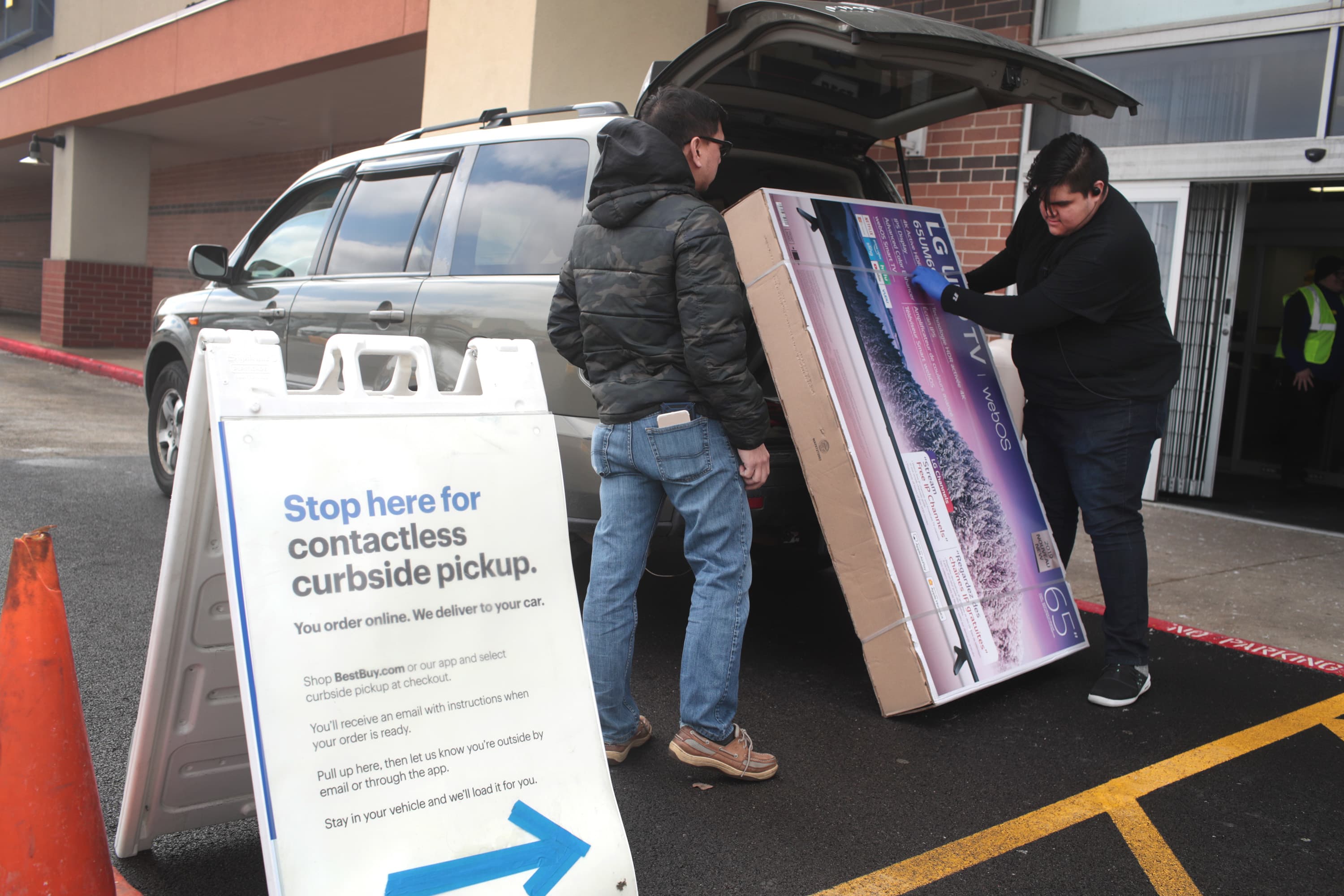Hits: 23

Selling to customers in stores by appointment only. Offering virtual tech support. And serving frustrated, sometimes hostile, customers.
That’s the new reality for Best Buy as it sells computer monitors, refrigerators and more during the coronavirus pandemic. The store has always been a place to touch and see the latest gadgets and electronics with its hands-on displays. But the company had to rethink that model as customers and employees worried about getting sick.
The big-box retailer’s shares are down more than 4% after it reported Thursday that its first-quarter earnings and revenue fell compared to a year ago, but its leaders emphasized the strength of its brand and its nimbleness in a challenging environment.
CEO Corie Barry explained her decision to close stores to customers and allow them back to stores, but by appointment only. She said the approach is a safer way to serve customers. And, she said, the personalized sales experience is a better fit for the retailer, which sells big-ticket items like gaming consoles, kitchen appliances and home theater systems.
“We have a little less of an impulse sales mentality at Best Buy,” she said in a call with reporters, pointing to its many higher-end consumer electronics items that can be complex to set up or operate.
When customers come in for their appointment, she said they get tailored one-on-one service — including a phone call before their visit to better understand and cater to their needs. That improves their experience and their impression of the company, she said.
Best Buy’s business approach has shifted dramatically in the past few months. In the early weeks of the pandemic, it saw a wave of sales as customers set up home offices and students prepared for remote learning.
In March, however, the company — which is considered an essential retailer — took a surprising step. It announced it would close stores to customers and switch to a curbside-only model. In April, it said it would take cost-cutting measures, including furloughing about 51,000 employees and cutting pay for top executives.
Best Buy said it retained 81% of last year’s sales for the last six weeks of the quarter — but the decision potentially left sales on the table as other essential retailers saw customers continue to flock to stores.
Barry defended the decision to close stores Thursday.
“I absolutely believe the decision we made is the right one,” she said.
In an interview with CNBC, Barry said she decided to close stores because employees were getting very nervous and she didn’t feel confident she could keep them safe. The company’s leadership team wasn’t sure it could get enough masks and gloves or quickly change operations to prevent the coronavirus from spreading at its stores.
“You think you will make a lot of certain decisions as a CEO,” she said. “But life and death decisions were not one of those.”
Barry said the company will continue to adapt and test new ways to serve customers — even as the pandemic makes it difficult to forecast the future. She said the way Best Buy does business won’t look the same across the country. Instead, she said, it will tailor its service to different regions and offer choices to customers that help put them at ease.
“We’re going to end up applying a variety of models across our footprint for the foreseeable future,” she said in a call with reporters.
Starting this month, most U.S. stores have reopened to customers, but only for one-on-one consultations. Employees have resumed visits to customers’ homes, but now wear protective gear. Many customers are still making purchases online and having them delivered to their homes or picking them up through curbside pickup outside of stores.
As stores reopen, she said employees have had to adjust to a more difficult environment, too. She said the company is providing training on how to de-escalate situations, as they’ve dealt with customers who are “scared, frustrated and occasionally hostile.”
“It can range from customers being frustrated that they can’t just walk into a store and get what they need to customers potentially not wanting to wear masks,” she said on a phone call with reporters.
With its appointment-only model, customers get one-on-one attention from a mask-wearing employee. The employee escorts the customer around the store, wipes down everything he or she touches and offers advice. Each customer gets a half hour appointment, though they can book more time, Barry said.
So far, she said demand has been highest with large home appliances. Home theater equipment has also been popular, she said.
About 700 of its approximately 1,000 U.S. stores offer the service. About 40 stores remain completely shut in parts of the country with more cases of the coronavirus, such as hard-hit parts of the East Coast.
She said Best Buy built a new data and analytics tool to monitor major factors that could affect sales patterns, such as the spread of the coronavirus in different parts of the U.S., the mobility of its customers and their demand for its goods.
At some stores, she said it plans to test longer hours and expanding beyond its appointment-only model.
Barry said in an analyst call that she expects the pandemic to spark innovation in technology and change customers’ long-term behaviors. That’s why, she said, the company is adjusting inventory and stocking up on products that support video conferencing, help with food preparation and keep families entertained.
— CNBC’s Courtney Reagan contributed to this report.
Be the first to comment